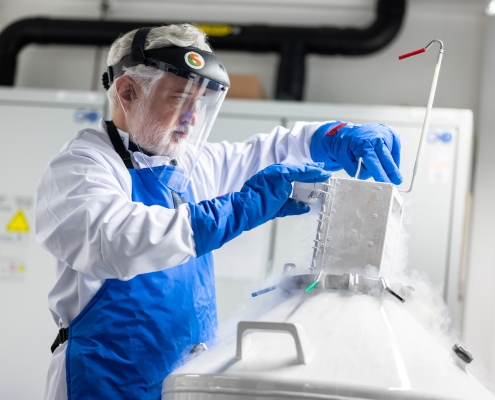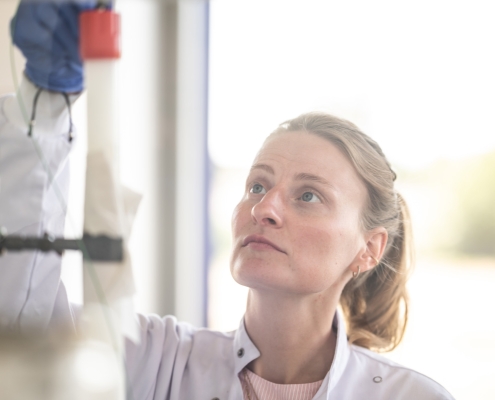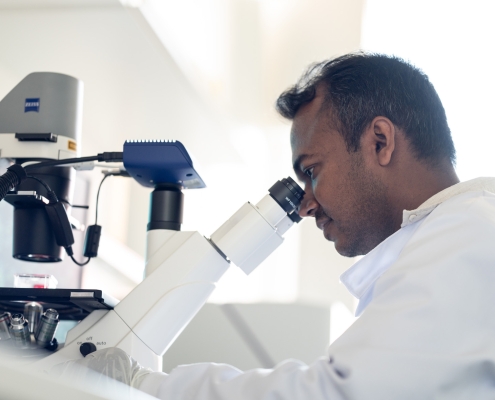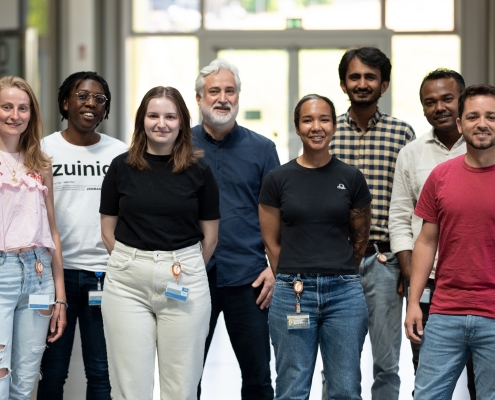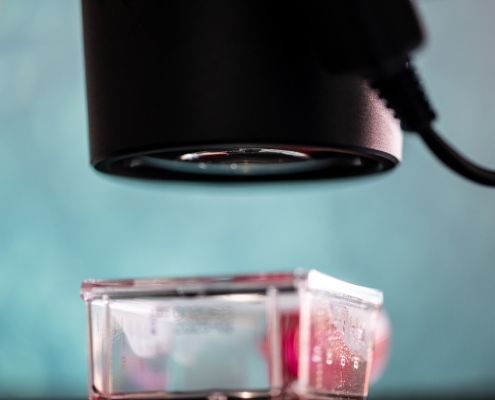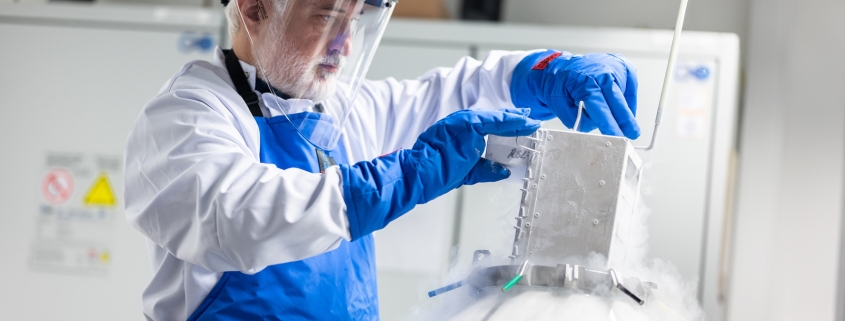
At the interface
03.11.2022 / Text: Alexandra von Knobloch / Fotos: Sascha Mannel
At the interface
To date, no vaccine exists for helminth parasites in humans, drugs are losing their efficacy and their administration does not protect against reinfection. In his DRUID professorship, Prof. Franco Falcone is looking for new approaches, from the development of new drugs to better diagnostics. He is not only focusing on biology.
In an ideal research world – as envisioned by Franco Falcone – experts in a field join forces worldwide to solve pressing scientific problems. In parasitology, Falcone’s field, the ideal could be implemented as follows: “We pick a parasite, all work on it in concert, and after two years we would have completed the biggest tasks,” Falcone says. “We would have developed a good diagnostic for that disease trigger, an effective drug and a vaccine to push back the disease.”
Once the mission is accomplished, the research community focuses on the next parasite – and can build on the findings of the first major project thus progress faster. “The Corona pandemic taught us how quickly you can move forward when many work together,” Falcone says.
Sharing experience and technology
Perhaps this perspective explains why the parasitologist is so enthusiastic about the research program of the LOEWE center DRUID, which currently funds a significant part of his scientific work at the Institute of Parasitology at the University of Giessen through a DRUID professorship. DRUID’s approach is quite close to Falcone’s ideal. “It’s a Hessian initiative, not a worldwide one,” he clarifies. “But I don’t know of any comparable project in Germany or elsewhere that focuses efforts against many serious tropical infectious diseases in this way.” Sharing experience and technology within DRUID accelerates research, he adds. “That’s great; it’s how we really move forward,” he says.
For example, in the lab one floor up, the DRUID junior research group led by Simone Häberlein is working on specific enzymes, protein kinases, just as Professor Falcone’s team is. In both cases, the long-term goal is the development of new drugs. They are looking for kinases that can be switched off by drugs so that the parasite dies. The difference: While Häberlein is focusing on the liver fluke Fasciola hepatica, Falcone is targeting the couple fluke Schistosoma mansoni, the causative agent of schistosomiasis. Different pathogens; nevertheless, much knowledge exchange is possible because of the common basic idea.
Biology and biochemistry studied as a double major
Franco Falcone appreciates the possibilities of DRUID for another reason. “The older I get,” reports the 57-year-old biologist and biochemist, “the more important it becomes to me that my research work is also leading to a concrete application.” Freedom in basic research and goal orientation complement each other very well within the DRUID consortium, Falcone thinks.
His research passion has been at the interface between biology and medicine since his doctoral thesis at the latest. Franco Falcone, who grew up in Luxembourg, initially began studying chemistry, but soon realized that he lacked the connection to the living world. After his intermediate diploma, he switched to biochemistry. Because that still did not contain enough “bios logos,” the “doctrine of life,” he also studied biology at the same time – and earned diplomas in both subjects in Tübingen.
Allergy risk complicates development
Of all the topics he came into contact with in biology, he says parasitology was the “eye opener” for him. “Highly fascinating” to realize the complex organisms that evolution produces and how extensively and specifically parasites are adapted to their hosts.
At least as exciting: “All the devastating diseases that parasitic worms cause in humans and the dire situation with neglected tropical diseases,” Falcone reports. That “hit home” with him. He wanted to do his part – as a research biologist. He did his doctorate at the Research Center Borstel, an institute of the Leibniz Association, on Schistosoma mansoni, a certain group of white blood cells, the basophilic granulocytes, and on immunoglobulin E (IgE).
This type of antibody is significantly involved in the development of allergies in humans. On the other hand, IgE antibodies also have a central benefit: They are important in warding off parasite infections. This ambivalent role of IgE in the immune system is far from being understood in detail scientifically. However, it is a major reason why it has not yet been possible to develop a vaccine against worm infections for humans.
“The challenge is to find an antigen of the parasite that is suitable for vaccine development. At the same time, however, it must not be recognized by IgE if at all possible – otherwise there is a risk of an systemic allergic reaction when a vaccination is given. That would be far too risky,” explains Falcone. Another of his DRUID-funded projects revolves precisely around finding the aforementioned matching molecule for vaccinations.
Better diagnostics for worm diseases
But there is a long way to go before that happens. As mentioned, the role of IgE in the host-parasite relationship is still poorly understood in the details. Falcone’s group is therefore currently working to better understand protective immune responses at the basic research level. The dog tapeworm, Echinococcus granulosus, which can also infect humans – i.e. so-called accidental hosts – is the research object for this. In addition to developing vaccines, his team hopes to use the knowledge gained to establish better diagnostic methods for parasitic diseases.
Current standard tests usually provide indications that a worm infestation exists, but there is a high likelihood of false positive results due to cross-reactivity between parasites. Finding out exactly which parasite is present in the body often requires a great deal of effort.
Particularly in the countries of the global south, where parasitic diseases are so widespread – especially among children and pregnant women – simple and reliable diagnostic methods are needed, such as screening for a panel of possible infections. “Our goal is to first develop a diagnostic technology for Echinococcus – and to do so in such a way that the principle can be easily transferred to other parasites,” Falcone reports.
As much networked science as possible
There it is again, the ideal of a systematic approach to urgent research tasks. The scientific methods Falcone uses to achieve this have often changed in the course of his university career: From 1997 to 1999, he worked as a DFG fellow, first in Edinburgh, Scotland, and then from 2003 to2019 in Nottingham, England, initially as a Wellcome Trust fellow, where he learned much from his environment at the School of Pharmacy about nanotechnology and targeted drug delivery. What has remained the same is his principled approach: “New research approaches and ideas often emerge by combining areas that traditionally tend to be considered separately,” he says. “For example, parasitology and allergology.” This networked thinking also lends itself well to DRUID projects, he adds.
Franco Falcone joined the university in Giessen in 2019. His team currently includes 6 members and is globally networked. Just recently, a visiting scientist from South Africa performed experiments in the Giessen labs on IgE-mediated allergy to red meat, usually triggered by tick bites – but possibly also by roundworms such as Ascaris lumbricoides. Parasites – IgE – Allergies: Here, too, the threads run into a common research thread and into the networked science that Falcone values so much.
Contact
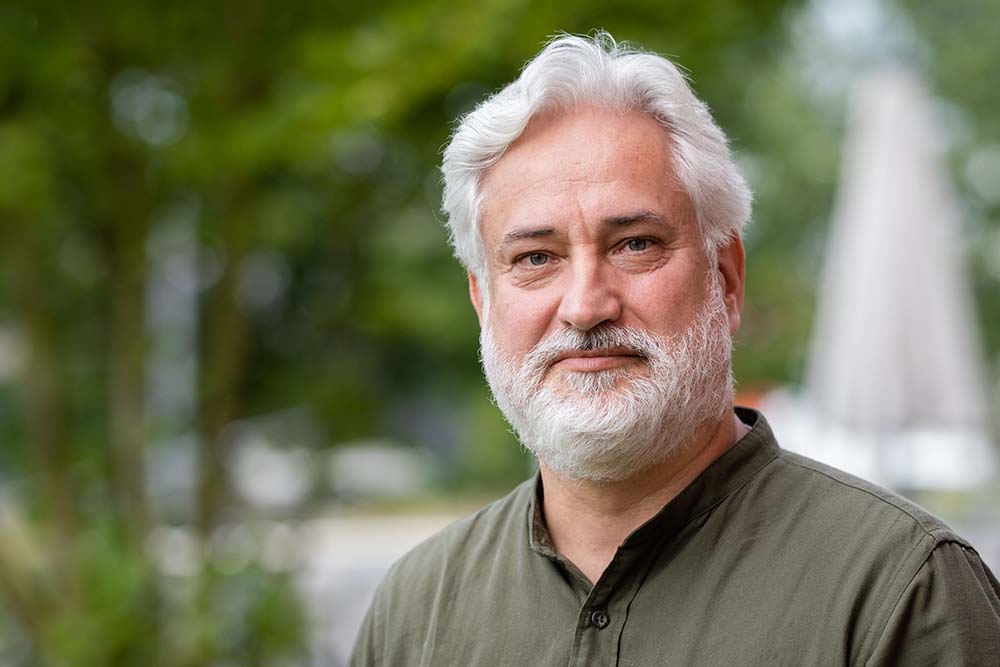
Prof. Dr. Franco Falcone
Institut für Parasitologie
BFS - Biomedizinisches Forschungszentrum Seltersberg
Justus-Liebig-Universität Gießen
Schubertstraße 81
35392 Gießen
Tel.: +49 (0)641-99 38030
E-Mail: franco.falcone(at)vetmed.uni-giessen(dot)de


